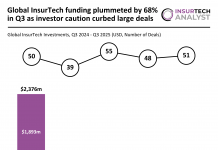North American InsurTech company Foxquilt has bagged $8m in a funding round that will support its expansion across the US and Canada.
The investment was led by Luge Capital, with commitments also coming from AmTrust Financial, Extreme Venture Partners and Side Door Ventures.
In addition to supporting its geographical growth, Foxquilt is using the fresh equity to hire more talent and bolster its product development.
The InsurTech company was created to remove the burdens small business owners face with insurance by providing them with a more transparent and valuable route. Instead of being a “one-size-fits-all” service, FoxQuilt is designed to give businesses the choice of what cover they get, with it underwritten on their specific business type and requirements.
Insurance policies available include general liability, professional liability, workers’ compensation, cyber, and commercial automobile.
Foxquilt CEO and co-founder Mark Morissette said, “Our goal at Foxquilt has always been to make life easier for small business owners. Whether you’re a sole proprietor or part of a larger enterprise network or marketplace, our technology-powered suite of products is made to digitize the insurance process and take one thing off an overfilled plate.”
Commenting on the investment, Luge Capital general partner David Nault said, “Of all the solutions we looked at, Foxquilt was by far the best one for SMBs and, given that they design their own insurance products and underwriting process, they can save their customers time, risk and money.
“We also loved that Foxquilt used a combination of proprietary data, AI and industry insights to properly assess risk and make the right recommendations to business owners.”
The InsurTech company previously raised $3.5m in a funding round back in 2020.
Copyright © 2021 FinTech Global










